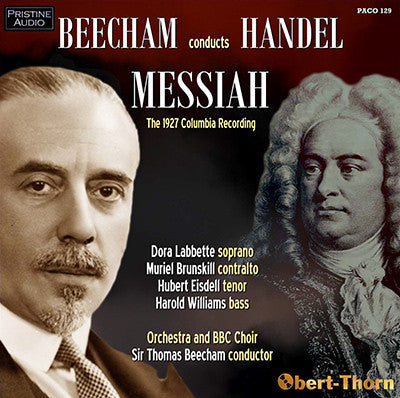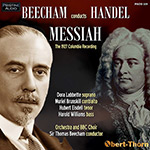
This album is included in the following sets:
This set contains the following albums:
- Producer's Note
- Full Track Listing
- Cover Art
Sir Thomas Beecham's "revolutionary" 1927 recording of the Messiah
“A performance that has great nervous energy, and that gives us all the strength ... that lies in the best parts of the music”
- The Gramophone, 1928
For this first extended recording of the electrical era, Beecham used the then-standard Ebenezer Prout edition with its customary cuts and simplified orchestration based on Mozart’s arrangement. Most curiously, the final “Amen” was not recorded, which left the performance ending in the dominant. For those who find this like “waiting for the other shoe to drop”, I have included as an appendix the finale taken from Beecham’s 1947 remake, although I have not joined it to the earlier recording so as not to falsify it. Also missing from the original set but presented here was the “Pastoral Symphony.” Though recorded during the Messiah sessions, it was not included because it would have been an odd side. It was instead released on a single disc with another coupling. (One wonders why Columbia didn’t record the “Amen” and include it with the “Pastoral Symphony” to fill out the set without any odd sides. Perhaps it was thought that an 18 disc set was already enough of a challenge for collectors to afford.)
Although EMI brought out an LP of excerpts, the present recording has only had one complete extended-play reissue, a Pearl CD set from 1990 which left out the “Pastoral Symphony” because the producers were unaware that it existed. The problems inherent in the original recording might have something to do with the paucity of reissues. Although the warm acoustic of Central Hall, Westminster is well caught and the balances between soloists, chorus and orchestra are good, the original discs sound muffled and bass-heavy. In order to bring out detail, I had to boost the upper frequencies a good deal, which also brought along a heavier-than-usual amount of surface noise. In addition to this, each side had a good amount of pitch drift, which Andrew Rose has successfully managed with the aid of Capstan software. The frequent, almost random volume level fluctuations during some of the choruses, however, proved to be an intractable problem.
The sources for the transfers were exceptionally quiet American Columbia “Full-Range” and “microphone” label pressings, except for the “Pastoral Symphony” side, which came from a first-edition laminated English Columbia disc.
Mark Obert-Thorn
-
HANDEL Messiah
CD 1 (61:03)
Part I
1 Overture
Recorded 9 July 1927 ∙ Matrix: WAX 2959-1 (Columbia L 2018)
2 Recit: Comfort ye, my people (Tenor)*
Recorded 8 October 1927 ∙ Matrix: WAX 3093-2 (Columbia L 2018)
3 Air: Ev'ry valley shall be exalted (Tenor)
Recorded 9 July 1927 ∙ Matrix: WAX 2958-1 (Columbia L 2019)
4 Chorus: And the glory of the Lord
Recorded 27 June 1927 ∙ Matrix: WAX 2890-6 (Columbia L 2019)
5 Recit: Thus saith the Lord (Bass)
Recorded 1 July 1927 ∙ Matrix: WAX 2933-4 (Columbia L 2020)
6 Air: But who may abide (Bass)
Recorded 1 July 1927 ∙ Matrices: WAX 2933-4 & 2938-4 (Columbia L 2020)
7 Chorus: And He shall purify
Recorded 24 June 1927 ∙ Matrix: WAX 2893-3 (Columbia L 2021)
8 Recit: Behold, a virgin shall conceive; Air & Chorus: O thou that tellest good tidings (Contralto)
Recorded 30 June 1927 ∙ Matrices: WAX 2928-2 & 2927-2 (Columbia L 2021/2)
9 Recit: For behold, darkness shall cover (Bass)
Recorded 1 July 1927 ∙ Matrix: WAX 2934-2 (Columbia L 2022)
10 Air: The people that walked in darkness (Bass)
Recorded 1 July 1927 ∙ Matrices: WAX 2934-2 & 2937-4 (Columbia L 2022/3)
11 Chorus: For unto us a child is born
Recorded 27 June 1927 ∙ Matrix: WAX 2891-4 (Columbia L 2023)
12 Pastoral Symphony
Recorded 2 July 1927 ∙ Matrix: WAX 2941-3 (Columbia L 2345)
13 Recit: There were shepherds abiding in the fields (Soprano)
14 Chorus: Glory to God in the highest
Recorded 28 June 1927 ∙ Matrix: WAX 2904-1 (Columbia L 2024)
15 Air: Rejoice greatly, O daughter (Soprano)
Recorded 7 July 1927 ∙ Matrix: WAX 2950-3 (Columbia L 2024)
16 Recit: Then shall the eyes; Air: He shall feed his flock (Contralto & Soprano)
Recorded 7 July 1927 ∙ Matrices: WAX 2947-4 & 2948-4 (Columbia L 2025)
17 Chorus: His yoke is easy
Recorded 30 June 1927 ∙ Matrix: WAX 2924-4 (Columbia L 2026)
CD 2 (63:05)
Part II
1 Chorus: Behold the Lamb of God
Recorded 27 June 1927 ∙ Matrix: WAX 2899-1 (Columbia L 2026)
2 Air: He was despised (Contralto)
Recorded 1 July 1927 ∙ Matrices: WAX 2935-2 & 2936-3 (Columbia L 2027)
3 Chorus: Surely, He hath borne our griefs
Recorded 27 June 1927 ∙ Matrix: WAX 2900-2 (Columbia L 2028)
4 Chorus: And with His stripes we are healed
Recorded 27 June 1927 ∙ Matrix: WAX 2901-1 (Columbia L 2028)
5 Chorus: All we like sheep have gone astray
Recorded 27 June 1927 ∙ Matrix: WAX 2898-2 (Columbia L 2029)
6 Recit: All they that see him (Tenor); Chorus: He trusted in God
Recorded 28 June 1927 ∙ Matrix: WAX 2902-2 (Columbia L 2029)
7 Recit: Thy rebuke hath broken His heart; Air: Behold, and see (Tenor)
Recorded 2 July 1927 ∙ Matrix: WAX 2939-2 (Columbia L 2030)
8 Recit: He was cut off out of the land; Air: But Thou didst not leave (Tenor)
Recorded 2 July 1927 ∙ Matrix: WAX 2940-3 (Columbia L 2030)
9 Chorus: Lift up your heads
Recorded 24 June 1927 ∙ Matrix: WAX 2892-3 (Columbia L 2031)
10 Air: How beautiful are the feet (Soprano)
Recorded 9 July 1927 ∙ Matrix: WAX 2956-2 (Columbia L 2031)
11 Air: Why do the nations so furiously rage (Bass)
12 Chorus: Let us break their bonds
Recorded 30 June 1927 ∙ Matrix: WAX 2925-5 (Columbia L 2032)
13 Recit: He that dwelleth in heaven; Air: Thou shalt break them (Tenor)
Recorded 9 July 1927 ∙ Matrix: WAX 2955-2 (Columbia L 2032)
14 Chorus: Hallelujah!
Recorded 28 June 1927 ∙ Matrix: WAX 2905-2 (Columbia L 2033)
Part III
15 Air: I know that my Redeemer liveth (Soprano)
Recorded 11 July 1927 ∙ Matrices: WAX 2969-2 & 2970-1 (Columbia L 2033/4)
16 Quartet & Chorus: Since by man came death*
Recorded 8 October 1927 ∙ Matrix: WAX 3092-2 (Columbia L 2034)
17 Recit: Behold, I tell you a mystery; Air: The trumpet shall sound (Bass)
Recorded 7 July 1927 ∙ Matrix: WAX 2949-4 (Columbia L 2035)
18 Chorus: Worthy is the Lamb
Recorded 28 June 1927 ∙ Matrix: WAX 2903-3 (Columbia L 2035)
Appendix from Beecham’s 1947 Recording:
19 Chorus: Amen**
Recorded 8 July 1947 ∙ Matrix: 2EA 11915-4 (RCA Victor 12-0117 in album M-1195)
Dora Labbette soprano
Muriel Brunskill contralto
*Nellie Walker, contralto
Hubert Eisdell tenor
Harold Williams bass
Orchestra and BBC Choir
**Luton Choral Society and Special Choir
**Herbert Dawson, organ
**Royal Philharmonic Orchestra
Sir Thomas Beecham conductor
Recorded in the Central Hall, Westminster, London
*The Portman Rooms, London
**Abbey Road Studio No. 1, London
Fanfare Review
As an extraordinary glimpse into the performance history of one of the seminal works in Western music, it is a release of immense importance
Thomas Beecham made three important recordings of Handel’s Messiah. This was the first (and the first relatively complete electrical recording), made in 1927. In 1947 he made a more complete version, briefly issued on CD by Pearl, and then in 1959 he produced for RCA the spectacularly reorchestrated version (there is some question as to how much of that reorchestration is Beecham and how much is Goossens). In the Fanfare Archive you can find two really perceptive reviews of the other two Beecham releases by John Bauman (who shares with me a guilty love for the over-the-top 1959 recording, complete with cymbals, French horns, and Lord knows what else).
In all three, Beecham demonstrates a deep love for the score, and a passion and energy that is clearly aimed at removing any stuffiness that may have accumulated. Contemporary accounts of this 1927 recording indicate that Beecham’s tempos were quicker, his rhythms sharper, and the energy level higher than was the custom at the time. Mark Obert-Thorn has done his typically superb work in cleaning up the sound, and providing a richness of balance and color that one would not have expected from these originals.
The performance uses the then-standard Prout edition of the score, based on Mozart’s reorchestration of Handel’s original, and employs some traditional cuts. The later recordings are both more complete, 1947 being the most complete of the three.
It would be impossible to recommend this recording to anyone looking for a basic Messiah, or even a Beecham Messiah. I wouldn’t want to be without the large-scaled 1959 performance, and perhaps even the 1947 version as well. But for anyone interested in the history of performance style, this is an extremely important recording. Prior to this the work was performed by large Victorian choirs and weighed down with slow tempos and heavy rhythms. Singers involved with this recording, and observers at the time, commented strikingly on the conductor’s lightening of the texture, and the addition of energy and tautness to the score. The contralto soloist in this recording is quoted as having said: “His tempi for this work, which now are taken for granted, were revolutionary; he entirely revitalized it, the old slow progress was gone forever. Messiah was reborn.”
There are a few oddities about this recording. Although the “Pastoral Symphony” was originally recorded, it was not included in the 78-rpm set (perhaps because it made for an odd side). When Pearl reissued this performance (in much thinner sound) they did not include the “Pastoral Symphony,” probably because they were unaware that it had been recorded. Pristine has included it—and what a wonderfully phrased bit of beautiful playing it is (yes, with plenty of vibrato). More confounding is that the original recording did not include the final “Amen.” There is no known explanation, and one is shocked that Beecham permitted this, as the work concludes on the dominant! Pristine, after a tasteful pause, adds “Amen” from Beecham’s 1947 recording. It doesn’t quite fit in terms of performance style and sound world, but it is better than leaving that shoe undropped.
The soloists are better in both of Beecham’s later recordings, though alto Muriel Brunskill and tenor Hubert Eisdell acquit themselves well enough here. Again, this cannot be thought of as anyone’s basic Messiah recording. But as an extraordinary glimpse into the performance history of one of the seminal works in Western music, it is a release of immense importance, and produced by Pristine at the highest possible level.
Henry Fogel
This article originally appeared in Issue 39:5 (May/June 2016) of Fanfare Magazine.

